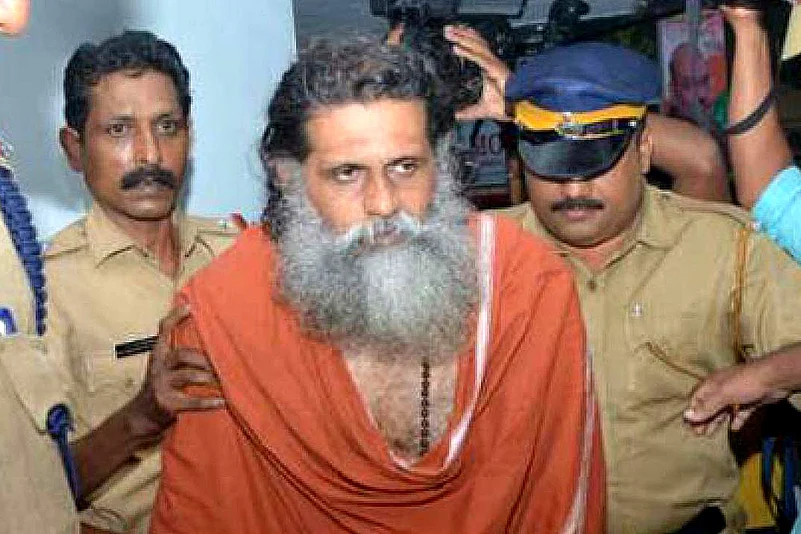The only miracle that can be attributed to Swami Ganaeshananda Theerthapada aka Sreehari or ‘Bullet Swami’, 54, is that he did not cry out when his penis was chopped off. It happened close to midnight while he was allegedly raping a 23-year-old-law student at her home in Thiruvananthapuram on May 19. In fact, not a squeak seems to have escaped his mouth. The girl’s parents, ardent devotees of the swami, were in the adjoining room but were oblivious to what was happening to their holy guest who was supposed to be sound asleep.
Sreehari had been raping her for six years, the girl told the police. Her family had met him at an ashram off Kollam, which he used to frequent. When the victim’s father was paralysed, he kept visiting the house on the pretext of healing him and praying for the family. This time, when Sreehari allegedly tried to rape her again, she was ready with a knife.
Sreehari is known more as a businessman than a holy man, and Panmana ashram was quick to disown him after the news. So did Hindu Aikyavedi and a state BJP leader, who he used to try and cultivate. The case itself went through a few twists. The swami told the police he himself had cut off his penis because it was no longer of any use. Even the girl supposedly retracted her rape allegation through a letter, and her mother claimed she was mentally unsound. The swami is now out on bail after a mere 19 days in prison. But with an emergency surgery having failed to fully restore his manhood, he should have all the time in the world to contemplate the Absolute.
Another spiritual organisation in Kerala, one of the largest in India, has attracted numerous allegations but no government has dared to order investigations against it. A 2013 book by a long-time Australian devotee of the ashram alleged a senior swami of the ashram had raped her. But, the government of the day did not initiate an investigation. In fact, a Malayalam channel, which dared to interview the Australian, came under assault. When rationalist Sreeni Pattathanam wrote a book about the organisation, a case was registered against him for hurting religious sentiments and a battery of lawyers descended from Delhi to defend the ashram. Pattathanam points out that a charitable trust can’t be a religion.
Another case that transpired here is that of Satnam Singh, a suspected bipolar and schizophrenic, who had come to Kerala seeking god from his home in Gaya, Bihar, in May 2012. His family, which had lost touch with him, later traced the sequence of events thus: Satnam had spent 20 days in a Sreenarayana Guru ashram where he was taught multi-religious chants and songs. Things took a dire turn on August 1 that year, when he visited this ashram. He ran towards its spiritual head, chanting something in Arabic. Other devotees captured him and manhandled him thinking he was a terrorist. More tragedy was to follow.
Satnam told his cousin, while in jail, that he could see an aura around the guru and that’s what had propelled his ecstatic rush. The Kerala police registered an attempt to murder case against him even though he had no weapon. His cousin, who reached Kerala on August 3, told the police that Satnam was bipolar, but he was not released on bail. Instead, he was sent to the mental asylum and on August 4, he was found dead with over 30-34 injury marks on his body. The post-mortem report says his skull was cracked.
Four staff members of the mental asylum were charged with murder. Says a relative: “We hear two of them are now dead and two are on bail. The case has not proceeded further. The police official who investigated the case is said to be a devotee of the guru. The High Court quashed our appeal for a CBI inquiry. We don’t know the language, we don’t know anyone. We are afraid of the powerful. We will never get justice.”
By Minu Ittyipe in Kochi


























